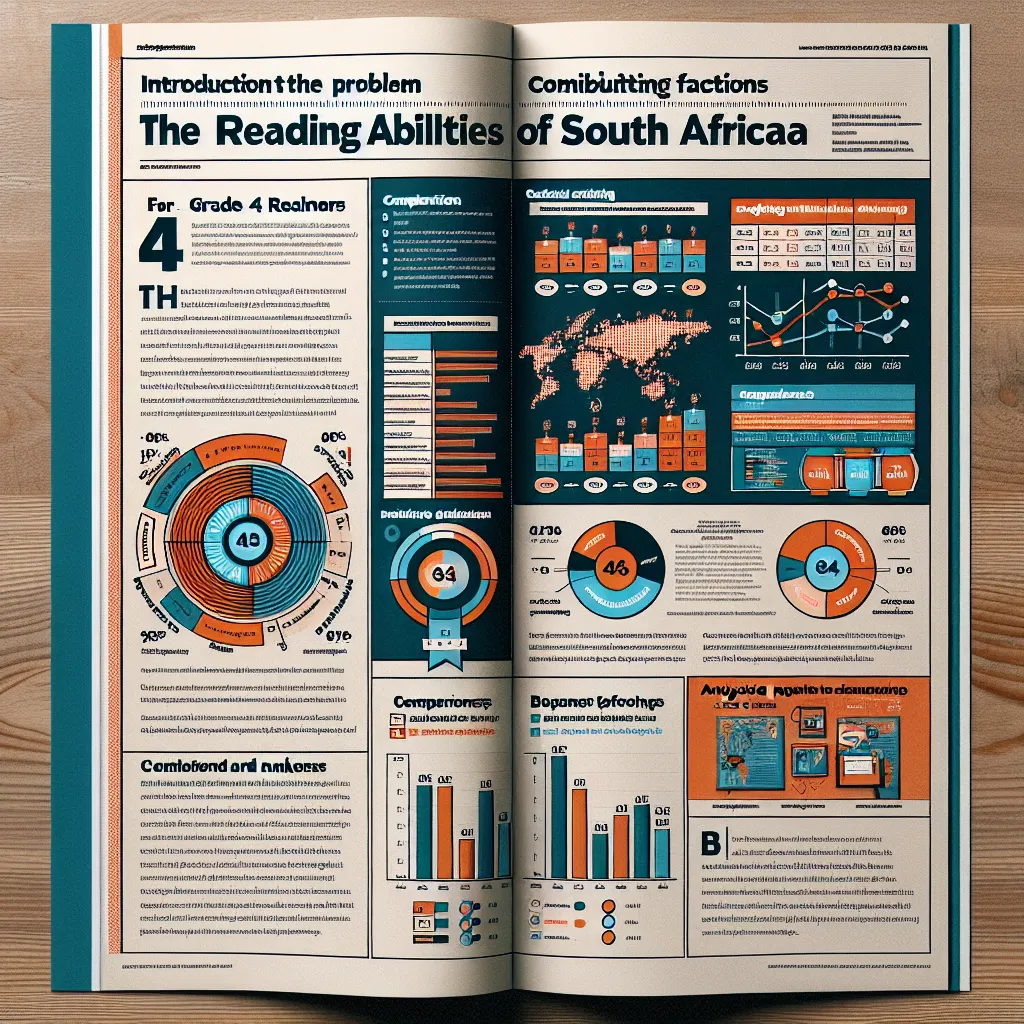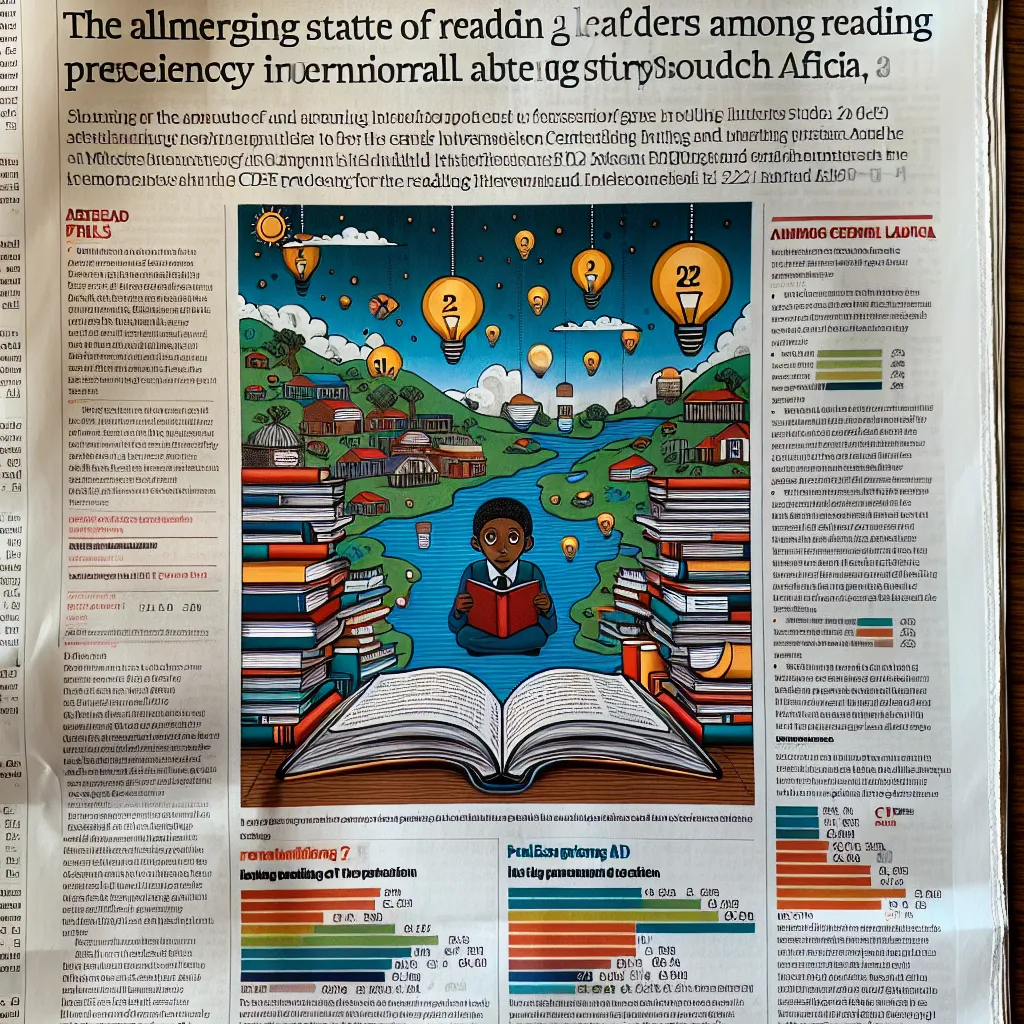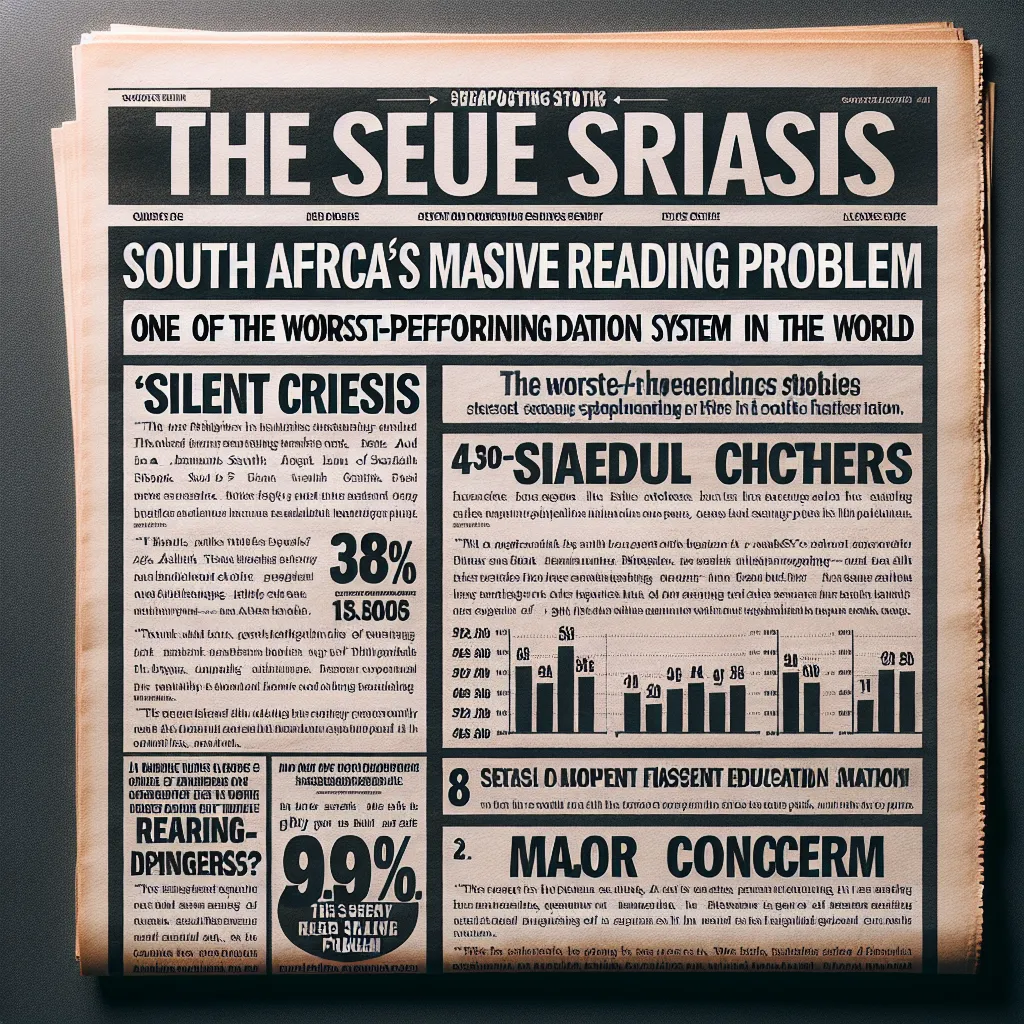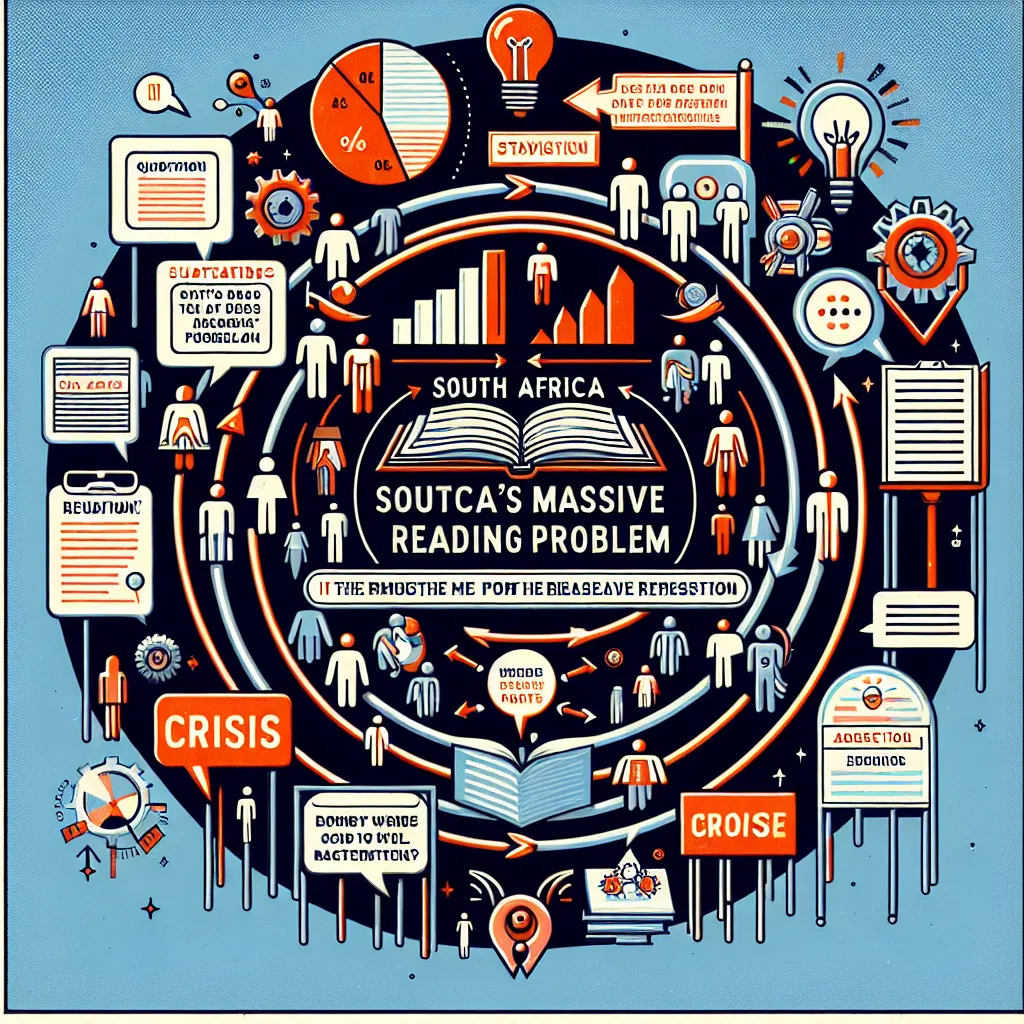Ask AI on The Internet
Question: South Africa’s massive reading problem Luke Fraser 16 May 2023 Grade 4 learners in South Africa have the worst reading ability in the world, with 81% incapable of reading for meaning. This is according to the 2021 Progress in International Reading Literacy Study (PIRLS 2021), which tested 12,426 learners across the country and compared them to students at a similar age level across 42 other nations. South Africa’s mean achievement score was 288 in the study, far below the 500 international average. Egypt was the second worst country in the study, but its score of 378 was well ahead of South Africa. A major concern for South Africa is that its achievement score has dropped significantly from the PIRLS 2016 study, where South Africa reported that 78% of children in Grade 4 could not read for meaning in any language. However, researchers noted that 21 of the 32 countries with trend data noticed a drop, with the Covid-19 pandemic having a major effect on teaching hours globally. In the 2021 study, Singapore (587), Hong Kong (573), the Russian Federation (567), England (588), and Finland (549) had the highest overall scores: The results in South Africa varied heavily across languages. Learners who were tested in Afrikaans and English scored significantly higher than those who were tested in African languages. Those tested in Afrikaans (387) and English (382) scored well above the average, while nine African languages scored below the mean, with Setswana (211) being the worstperforming language. Moreover, the Western Cape (363), Gauteng (320) and Kwa-Zulu Natal (297) outperformed the 288 mean, with more remote provinces Limpopo (244) and North-West (232) significantly lower. The biggest area of concern is that 81% of learners in the study were below the study’s low international benchmark, meaning that 81% of students cannot read for meaning. Moreover, only 11% of learners reached the low international benchmark, while 94% of students internationally could reach the low international benchmark. For South Africa, only 2% of readers could reach a high benchmark, while 1% reached the advanced benchmark. State of education The Centre for Development and Enterprise (CDE) previously said that South Africa has one of the worst-performing education systems in the world. “The President speaks of a ‘silent revolution’, while the minister talks of a ‘system on the rise’. The truth is that we face a silent crisis in our schools: South Africa has one of the worst performing education systems in the world,” said CDE’S Executive Director Ann Bernstein. The CDE said that South Africa spends roughly 13% of government revenue on education, which should improve competitive learning levels, reduce learning inequality, and train a large workforce. However, Professor Lant Pritchett said that South Africa is the biggest learning underperformer relative to GDP per capita among low and middle-income countries. Despite spending equivalent levels as high achieving Scandinavian countries, South Africa’s learning outcomes are worse than Kenya, Tanzania and Eswatini. Although poverty and ongoing infrastructural challenges have a debilitating effect on students, the incompetence of teachers has a massive effect on results. 80% of teachers in public schools lack the content knowledge and pedagogical skills for their subjects, For instance, the proficiency level of South African teachers (41%) is far below that of teachers in Zimbabwe (87%). Corruption is also not helping South Africa’s education system. A 2015 report by the National Education Evaluation and Development Unit (NEEDU) used to assess rural literacy found corrupt teacher hiring and promotion processes from union involvement. The “jobs for cash” scandal, as it was known, saw SADTU – the country’s dominant teacher union – get favoured individuals onto school governing bodies (SGBs) to ensure that those who paid positions could get them. The Minister of Education appointed a ministerial task team (MTT) to investigate the scandal, but Bernstein said that no government officials were prosecuted or suspended. Moreover, none of the MIT recommendations to tackle corruption have been implemented. Read: ‘Silent crisis’ at schools in South Africa – education department responds Source: South Africa’s massive reading problem – BusinessTech QUESTION 1: Genre, context, and register Read Text A and write a coherent and well-constructed answer in which you analyse the structure, dont leave out anything
### Genre, Context, and Register Analysis of Text A #### Genre: Text A is a report. It is structured to provide factual information and analysis on South Africa's reading abilities among Grade 4 learners based on findings from the 2021 Progress in International Reading Literacy Study (PIRLS). #### Context: The context of the text relates to the state of education in South Africa, particularly focusing on the reading abilities of Grade 4 students. The text highlights alarming statistics and makes comparisons with other countries to underscore the severity of the issue. It also delves into the systemic and infrastructural challenges that contribute to the dismal performance, such as poverty, inadequate teacher proficiency, and corruption. #### Register: The register of the text is formal and informative. The language is precise, objective, and intended for an audience seeking detailed and authoritative information about the education system in South Africa. The text is replete with statistics, expert opinions, and references to reports and studies, which all underscore its formal register. ### Structure Analysis 1. **Introduction (Opening Paragraphs):** - The text begins with a startling statistic: 81% of Grade 4 learners in South Africa cannot read for meaning. This immediate revelation sets a grave tone and signals the reader on the critical issue at hand. - The introductory sentences also reference the PIRLS 2021 study, providing a credible source for the data presented. 2. **Comparative Analysis:** - The text continues by comparing South Africa’s performance with other countries. It notes that South Africa's mean achievement score is significantly below the international average of 500. - Includes a comparison with Egypt, the second-worst performer in the study, highlighting that even Egypt’s lower score is significantly ahead of South Africa’s. 3. **Historical Context:** - A historical perspective is provided by comparing the 2021 results with those from PIRLS 2016. This points to a decline in reading capabilities over time. - Additionally, it mentions the global trend of declining reading abilities due to the COVID-19 pandemic, situating South Africa within a broader international context. 4. **Language and Regional Variations:** - The report dissects the performance across different languages within South Africa. Afrikaans and English speakers outperform those speaking African languages. Setswana is highlighted as a particularly low-performing language. - Regional disparities are also discussed, with provinces like the Western Cape and Gauteng outperforming more remote provinces like Limpopo and North-West. 5. **Statistical Breakdown:** - Provides a detailed statistical breakdown, specifying that 81% of students are below the low international benchmark, and only a small percentage reach higher benchmarks. - This section underscores the gravity of the reading crisis with hard numbers, enhancing the report's factual rigor. 6. **Critique and Expert Opinions:** - The text includes critiques from authoritative bodies like the Centre for Development and Enterprise (CDE), which labels the South African education system as one of the worst-performing globally. - It also references experts like Professor Lant Pritchett, who discusses South Africa's underperformance relative to its GDP per capita. 7. **Contributing Factors:** - Delves into various contributing factors, including incompetent teachers and corruption within the education system. - Specific examples such as the "jobs for cash" scandal involving the SADTU are highlighted to illustrate systemic issues. 8. **Conclusion (Final Paragraphs):** - The text concludes by questioning the government's response, noting that despite investigations and recommendations, no significant actions have been taken to address the corruption and inefficiency. ### Conclusion: The structure of Text A is meticulously organized to build a compelling narrative around the reading crisis in South Africa's education system. It starts with an impactful introduction, provides comparative and historical context, dissects language and regional disparities, offers a statistical breakdown, includes expert critique and analysis of contributing factors, and finally, concludes with commentary on the government's inadequate response. The formal and informative register supports the purpose of the text, addressing an audience interested in educational policy, systemic reform, and social development.
Think your answer is better than the AI's? Post it below.
Other Most Relevant Posts:
Question Tags
If you want your question answered by an AI, click here.







Post your own comment: